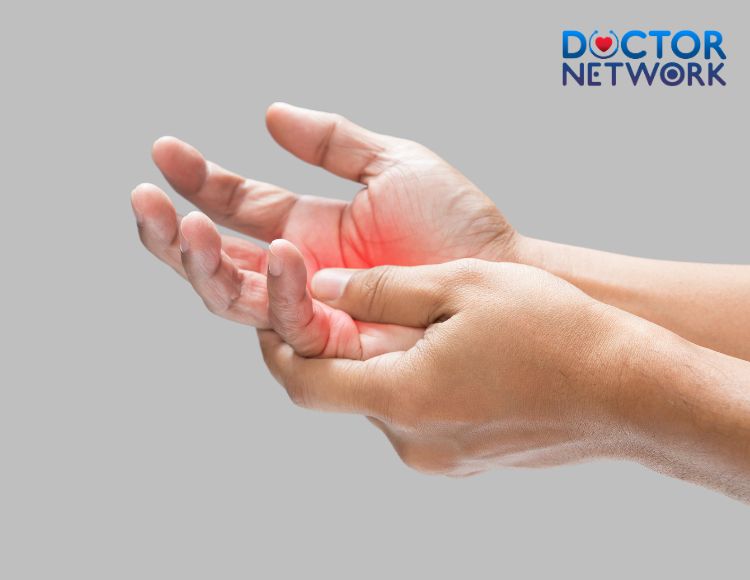Cerebral ischemia is a condition where the brain does not receive adequate blood flow to function properly. The brain requires oxygen and nutrients from the blood to function, and when this supply is deficient, brain cells can be damaged, leading to long-term consequences such as stroke. Early recognition of the “5 signs of cerebral ischemia” below is a crucial step in protecting brain health.
Headaches due to cerebral ischemia
Headaches are one of the common signs of cerebral ischemia. The nature of the pain can be dull, severe, or localized to a specific area of the head. Headaches due to cerebral ischemia often stem from a lack of oxygen to the brain, with changes in cerebral blood vessels causing a sense of throbbing pain. Immediate medical attention is necessary when experiencing severe headaches accompanied by other dangerous symptoms (vomiting, limb weakness, etc.).

Headache is one of the 5 common signs of cerebral ischemia
Dizziness due to cerebral ischemia
Patients feel everything spinning, experience loss of balance, and dizziness. This sensation can last from a few seconds to minutes or longer. Dizziness due to cerebral ischemia occurs when blood supply to the vestibular organs (responsible for balance) is reduced. Dizziness accompanied by ringing in the ears, visual disturbances, nausea… should be carefully noted as it signals one of the serious signs of cerebral ischemia.
Numbness in limbs due to cerebral ischemia
Numbness, tingling sensations, loss of sensation in the hands, and feet are easily recognizable symptoms of cerebral ischemia. Numbness can occur on one side or both sides of the body. The peripheral nervous system requires nourishment from blood. When cerebral ischemia occurs, the function of the nervous system is affected, resulting in symptoms of numbness. Prolonged numbness accompanied by muscle weakness, difficulty moving may be one of the signs of cerebral ischemia, requiring early examination.

Numbness in the hands and feet is one of the 5 signs of cerebral anemia
Visual disturbances due to cerebral ischemia Cerebral ischemia reduces the function of the optic nerve and areas of the brain related to vision, causing symptoms such as:
- Blurred vision, seeing double
- Narrowing of the visual field (seeing the surrounding space narrowed)
- It is essential to distinguish from common eye diseases.
- Visual impairment due to cerebral ischemia is often transient, different from long-term eye issues.
Memory loss, lack of concentration due to cerebral ischemia
When the brain is not adequately supplied with oxygen and nutrients, brain cells function poorly, leading to forgetfulness, reduced ability to concentrate, affecting work and study. This condition can progress long-term and contribute to an increased risk of cognitive decline in older adults.

Vision disorders are one of the 5 signs of cerebral anemia
Who is at risk of cerebral ischemia?
Elderly individuals People with underlying medical conditions: cardiovascular diseases, high blood pressure, diabetes, high cholesterol,… People with unhealthy lifestyles: heavy smoking, prolonged stress, lack of exercise, poor diet,…
How to prevent cerebral ischemia? Effectively manage underlying medical conditions (if any). Maintain a balanced diet rich in vegetables, fruits, limit animal fats, processed sugars,… Regular exercise, increase physical activity. Ensure adequate sleep, relaxation, reduce stress. Regular health check-ups, especially for those at high risk. When should you see a doctor immediately? If any of the “signs of cerebral ischemia” appear, especially suddenly and severely. Symptoms accompanied by facial drooping, limb weakness, speech difficulties,… Changes in consciousness: confusion, drowsiness.
Some frequently asked questions about “5 signs of cerebral ischemia”
Here are 5 frequently asked questions related to the topic “5 signs of cerebral ischemia”, along with expert responses from a medical perspective:
Can cerebral ischemia be cured?
The likelihood of recovery from cerebral ischemia depends on several factors:
The severity of cerebral ischemia (mild, severe, transient or prolonged) Underlying medical conditions as the cause of cerebral ischemia (if any) Time of detection and timely treatment Appropriate treatment protocols tailored to the patient’s condition
If cerebral ischemia is mild, detected early, and actively treated, the chance of recovery is relatively high. Severe cases, with significant brain damage, may have difficulty achieving complete recovery.
Is cerebral ischemia dangerous?
Cerebral ischemia poses many risks, especially if not promptly addressed. Some dangerous complications may include:
Cerebral infarction: Prolonged ischemia leads to brain cell death, forming infarcted areas, with a high risk of death. Stroke: The most severe complication of cerebral ischemia. Cognitive decline: Long-term brain damage leads to a decline in cognitive function, increasing the risk of cognitive decline.
Where to seek medical advice for cerebral ischemia?
You can consult the following specialties for the diagnosis of cerebral ischemia:
Neurology Department: Physicians will directly examine symptoms, evaluate neurological signs. Cardiology Department: Evaluate cardiovascular risk factors that may be the cause of cerebral ischemia. Other specialties if there is suspicion of underlying conditions (diabetes, hypertension,…)
What tests are used to diagnose cerebral ischemia?
After clinical examination, physicians may prescribe various tests, imaging techniques to diagnose cerebral ischemia, including:
Complete blood count, evaluation of anemia (if any) Blood lipid tests, blood sugar, liver and kidney function… Echocardiography, Doppler ultrasound of cerebral blood vessels. Computed tomography (CT) or magnetic resonance imaging (MRI) of the brain.
Is headache a sign of cerebral ischemia?
Headaches are one of the common signs of cerebral ischemia. However, headaches also occur in many other conditions (stress, lack of sleep, sinusitis,…). Therefore, when experiencing headaches accompanied by other symptoms such as dizziness, numbness in limbs, visual disturbances,… you should pay close attention as it may be a sign of cerebral ischemia.
Some scientific evidence related to the “5 signs of cerebral ischemia”
- A study in 2017 showed that 67% of patients with cerebral ischemia had headache symptoms, often characterized by tension-type headaches, dull pain, or unilateral headaches.
- A study in 2015 found that dizziness was the second most common symptom of cerebral ischemia, accounting for 45% of cases.
- A study in 2016 showed that 38% of patients with cerebral ischemia had symptoms of numbness in limbs, often occurring on one side of the body.
- A study in 2014 found that 22% of patients with cerebral ischemia had symptoms of visual disturbances, including blurred vision, double vision, or narrowed visual fields.
Early detection of the “5 signs of cerebral ischemia” helps you take timely treatment measures, reducing the risk of dangerous complications. In addition to raising awareness, everyone needs to actively build a healthy lifestyle and undergo regular check-ups to protect long-term brain health.
References:
https://pubmed.ncbi.nlm.nih.gov/17023891/
https://www.mountsinai.org/health-library/diseases-conditions/iron-deficiency-anemia
https://www.piedmont.org/living-real-change/5-symptoms-of-an-iron-deficiency
Kiểm Duyệt Nội Dung
More than 10 years of marketing communications experience in the medical and health field.
Successfully deployed marketing communication activities, content development and social networking channels for hospital partners, clinics, doctors and medical professionals across the country.
More than 6 years of experience in organizing and producing leading prestigious medical programs in Vietnam, in collaboration with Ho Chi Minh City Television (HTV). Typical programs include Nhật Ký Blouse Trắng, Bác Sĩ Nói Gì, Alo Bác Sĩ Nghe, Nhật Ký Hạnh Phúc, Vui Khỏe Cùng Con, Bác Sỹ Mẹ, v.v.
Comprehensive cooperation with hundreds of hospitals and clinics, thousands of doctors and medical experts to join hands in building a medical content and service platform on the Doctor Network application.






























